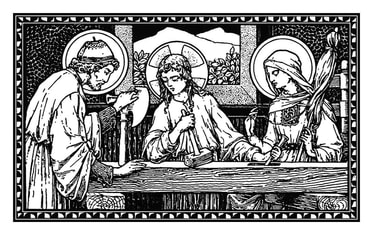 Luke 2:22, 39-40 ‘The child grew to maturity, and he was filled with wisdom; and God’s favour was with him’ (Luke 2:40) I chose to read the shortened version of our gospel this morning for two reasons; first we are going to encounter this passage again in a few weeks’ time at Candlemas, and secondly, the main point Luke wants to make this morning is that Jesus, the eternal Son of God the Father, grew up and was formed in a human family – that Holy Family. Today’s celebration can teach us something about our faith. Falling on the Sunday in the Octave of Christmas, the Feast of the Holy Family is a natural extension of Christmas Day itself, the next step in unfolding the mystery of the Incarnation. God the Son chose to become “God-with-us”, he chose to become incarnate in Mary, he chose to be born in humble conditions; then he also chose to grow up as children do within the ordinariness of a human family. In this Holy Family, God humbled himself to learn obedience to earthly parents and how to relate to other people. Why? In his loving purpose to redeem us in Jesus Christ, God assumed our flesh, our nature, and all the triviality of our being human; so he assumed also the tricky dynamics of human relationships, including family life. So in honouring the Holy Family we see how Jesus redeemed everything about our lives, even our sometimes dysfunctional families, showing us a better way, a holy way, to be family… A better way to be family… These are loaded words. I understand it. And on this feast there is always a strong danger for preachers to hold up the Family of Nazareth as the divine blue print for the ideal set up of a Christian family – mummy and daddy are happily married, and their child is so adorably well-behaved that even a carol sings “no crying he makes”. I say a danger because a family so idealized could be a stumbling block for many of us, rather than an inspiration. Besides, in practice families don’t always work like that, and our domestic arrangements are, more often than not, rather more complicated that the ones faced by the Holy Family, even with all their travels as refugees, and their having to lodge in a stable – mummy and daddy are not necessarily happily married, or together at all, and sometimes the children can be a bit of a handful to say the least. So, what would the Feast of Holy Family teach us, teach our families, today? Rather than a blue print for our domestic set up they can become a spiritual model for our families in the sense that in the home of Nazareth we see an “authentic school of the Gospel” (JPII & Francis, Angelus Messages on 30 Dec 2001 & 27 Dec 2015), where Mary and Joseph, gathered around the living Word of God, lead their household in a way that is intentionally centred on faith and commitment to God. We must look beyond the very unique features of the Holy Family’s domestic arrangements to see how Jesus, Mary, and Joseph can teach every home to be or become a “domestic church” (Lumen Gentium)– a community where the Christian habits of love, faith, and hope are practiced and taught; a haven of unconditional affection, a place where – as the introduction to the wedding service says – ‘each member, in good times and in bad, can find strength, companionship and comfort, and grow to maturity in love.’ May the prayers of the Holy Family help us to put God at centre of our homes, and gain for us the grace we need to imitate their devotion to one another in our relationships. Amen.
0 Comments
|
Archives
June 2020
Categories
All
|
 RSS Feed
RSS Feed


